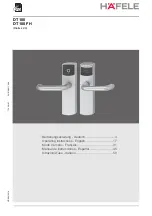Chapter 8 Central Processor Unit (S08CPUV5)
MC9S08QL8 MCU Series Reference Manual, Rev. 1
98
NXP Semiconductors
Figure 8-2. Condition Code Register
Table 8-1. CCR Register Field Descriptions
Field
Description
7
V
Two’s Complement Overflow Flag
— The CPU sets the overflow flag when a two’s complement overflow occurs.
The signed branch instructions BGT, BGE, BLE, and BLT use the overflow flag.
0 No overflow
1 Overflow
4
H
Half-Carry Flag
— The CPU sets the half-carry flag when a carry occurs between accumulator bits 3 and 4 during
an add-without-carry (ADD) or add-with-carry (ADC) operation. The half-carry flag is required for binary-coded
decimal (BCD) arithmetic operations. The DAA instruction uses the states of the H and C condition code bits to
automatically add a correction value to the result from a previous ADD or ADC on BCD operands to correct the
result to a valid BCD value.
0 No carry between bits 3 and 4
1 Carry between bits 3 and 4
3
I
Interrupt Mask Bit
— When the interrupt mask is set, all maskable CPU interrupts are disabled. CPU interrupts
are enabled when the interrupt mask is cleared. When a CPU interrupt occurs, the interrupt mask is set
automatically after the CPU registers are saved on the stack, but before the first instruction of the interrupt service
routine is executed.
Interrupts are not recognized at the instruction boundary after any instruction that clears I (CLI or TAP). This
ensures that the next instruction after a CLI or TAP will always be executed without the possibility of an intervening
interrupt, provided I was set.
0 Interrupts enabled
1 Interrupts disabled
2
N
Negative Flag
— The CPU sets the negative flag when an arithmetic operation, logic operation, or data
manipulation produces a negative result, setting bit 7 of the result. Simply loading or storing an 8-bit or 16-bit value
causes N to be set if the most significant bit of the loaded or stored value was 1.
0 Non-negative result
1 Negative result
1
Z
Zero Flag
— The CPU sets the zero flag when an arithmetic operation, logic operation, or data manipulation
produces a result of 0x00 or 0x0000. Simply loading or storing an 8-bit or 16-bit value causes Z to be set if the
loaded or stored value was all 0s.
0 Non-zero result
1 Zero result
0
C
Carry/Borrow Flag
— The CPU sets the carry/borrow flag when an addition operation produces a carry out of bit
7 of the accumulator or when a subtraction operation requires a borrow. Some instructions — such as bit test and
branch, shift, and rotate — also clear or set the carry/borrow flag.
0 No carry out of bit 7
1 Carry out of bit 7
CONDITION CODE REGISTER
CARRY
ZERO
NEGATIVE
INTERRUPT MASK
HALF-CARRY (FROM BIT 3)
TWO’S COMPLEMENT OVER
7
0
CCR
C
V 1 1 H I N Z
Summary of Contents for MC9S08QL4
Page 4: ...MC9S08QL8 MCU Series Reference Manual Rev 1 4 NXP Semiconductors...
Page 36: ...Chapter 3 Modes of Operation MC9S08QL8 MCU Series Reference Manual Rev 1 36 NXP Semiconductors...
Page 56: ...Chapter 4 Memory MC9S08QL8 MCU Series Reference Manual Rev 1 56 NXP Semiconductors...
Page 172: ...Modulo Timer S08MTIMV1 MC9S08QL8 MCU Series Reference Manual Rev 1 172 NXP Semiconductors...
Page 238: ...Development Support MC9S08QL8 MCU Series Reference Manual Rev 1 238 NXP Semiconductors...
Page 239: ......


















